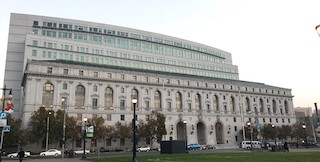The Gist of this Article: Under Penal Code § 459.5 (shoplifting), as provided in Prop 47, a “commercial establishment” includes a private country club because, as the First Appellate District Court read Prop 47, its provisions “shall be liberally construed to effect its purpose.”
In 2013, Jon F. Holm was charged with burglary, receiving stolen property, and false impersonation. He later pleaded no contest to second degree burglary (Penal Code § 459) as a felony and to false impersonation as a misdemeanor.
Holm admitted to taking a television valued at $662.23 and three boxes of golf balls, valued at $50 each from the Santa Rosa Golf and Country Club.
The following year, California voters approved Proposition 47, which made certain felonies eligible for resentencing as misdemeanors under Penal Code § 1170.18. Holm then filed his petition for resentencing of his felony Penal Code § 459 conviction, arguing, that his conduct fell within the definition of Penal Code § 459.5, a misdemeanor.
Section 459.5 defined shoplifting as entering a commercial establishment with the intent to steal unless the prosecution proves the value of the items stolen exceeds $950.
People v. Skerrow (2015) 239 Cal.App.4th 875, 191 Cal.Rptr.3d 295. Section 459.5 further specifies that the offense must be committed while the establishment is open during regular business hours.
At the hearing on the petition, the prosecution had Don Florriani, manager of the golf club, testify concerning the thefts. He testified that the country club was a private club open only to members and not open to the general public. He further testified that Holm used to be a member of the club, but was expelled in 2011.
 Court of Appeal First Appellate District San Francisco
Court of Appeal First Appellate District San Francisco
The Sonoma County judge hearing the petition denied it because the judge did not think the private county club was a commercial establishment within the meaning of Prop 47. The judge emphasized that to be at the club, one had to be a member or a guest of a member and, at the time of the theft, Mr. Holm was an ex-member, expelled in 2011.
Holm believed the judge had made a mistake, so he appealed the ruling to the First Appellate District.
In
People v. Jon F. Holm (2016 DJDAR 9352), the appellate court agreed with Holm, beginning with an opening comment that the Voter Information Guide for Prop 47 noted the act “shall be liberally construed to effectuate its purpose.”
The appellate court acknowledged that the Attorney General urged it focus on the “common understanding of shoplifting” and construe “commercial establishment” to mean “a store or shop that is open to the public with regular business hours.” However, the appellate court said it could not short circuit the task of statutory construction and must instead look at the words of the statute and their plain meaning. See
Imperial Merchant Services, Inc. v. Hunt (2009) 47 Cal.4th 381, 387-88, 97 Cal.Rptr.3d 464, 212 P.3d 736.
The appellate court then looked to other decisions and what places they had considered a “commercial establishment” for purpose of Prop 47 and Penal Code § 459.5.
In re J.L., for example, had considered whether a public school was a commercial establishment.
In re J.L. (2015) 242 Cal.App.4th 1108, 1114, 195 Cal.Rptr.3d 482. It found it was not a commercial establishment.
In re J.L. at 1114.
However, in
People v. Hudson (Aug. 16, 2016, 2016 WL4366796), the court held that a commercial bank was a commercial establishment. In
People v. Stylz, however, a locked storage unit was not a commercial establishment.
People v. Stylz (Aug. 15, 2016, 13263072, 2016 WL 4272014).
Turning to the facts of Holm’s case, the court found the country club was an establishment “primarily engaged in the sale and goods and services.” The fact that the goods and services are offered to only a subset of the general population does not change the fundamental purpose of the club.
The appellate court consequently reversed the order denying Holm’s petition and remanded the matter to the trial court for further proceedings consistent with the ruling.
The citation for the First Appellate District Court ruling discussed above is People v. Jon F. Holm (1st App. Dist., 2016) 3 Cal.App.5th 141 , 207 Cal. Rptr. 3d 439.
For more information about Proposition 47 and shoplifting, please click on the following articles:
- Does Felony PC § 459 Qualify Under Prop 47 as PC § 459.5?
- Prop 47 Relief Denied on Grand Theft Conviction – Why?
- Is Using a Stolen Credit Card Eligible for Prop 47 Relief?
Contact us.  Court of Appeal First Appellate District San Francisco
Court of Appeal First Appellate District San Francisco